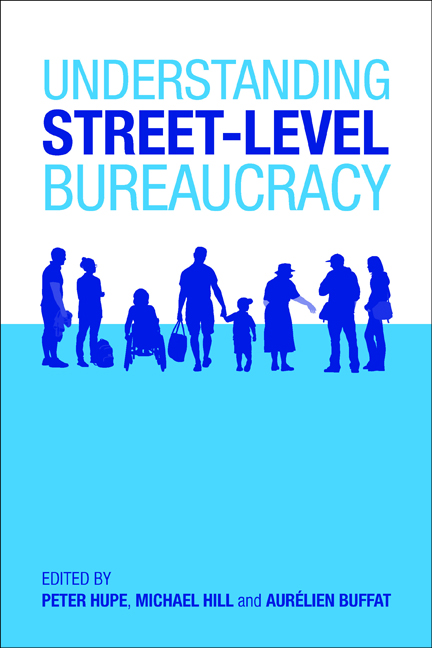Book contents
- Frontmatter
- Contents
- Biographical notes
- Preface
- Part One Introduction
- Part Two Delivering services and benefits: street-level bureaucracy and the welfare state
- Part Three Agents of the state: street-level bureaucracy and law enforcement
- Part Four Embedded in society: street-level bureaucrats as public actors
- Part Five The management of street-level bureaucrats
- Part Six The promise of professionalism
- Part Seven Conclusion
- References
- Index
Five - When and why discretion is weak or strong: the case of taxing officers in a Public Unemployment Fund
Published online by Cambridge University Press: 08 March 2022
- Frontmatter
- Contents
- Biographical notes
- Preface
- Part One Introduction
- Part Two Delivering services and benefits: street-level bureaucracy and the welfare state
- Part Three Agents of the state: street-level bureaucracy and law enforcement
- Part Four Embedded in society: street-level bureaucrats as public actors
- Part Five The management of street-level bureaucrats
- Part Six The promise of professionalism
- Part Seven Conclusion
- References
- Index
Summary
Introduction
This chapter is about discretion exerted by public agents at the front line. Davis (1969, p 4) defines discretion as follows: a public officer has discretion wherever the effective limits on his power leave him free to make a choice among possible courses of action and inaction. For Vinzant and Crothers (1998, p 37), discretion means the power of free decisions or the latitude of choice within certain legal bounds. For Hupe (2013, p 435), discretion consists in granted freedom to act within prescribed limits. In addition, the distinction that Hupe (2013, pp 434–5) makes between discretion-as-granted and discretion-as-used will be of particular relevance in this chapter, where the analytical focus is mainly on the level of discretion used by front-line workers, while also considering granted discretion as one factor – among others – influencing it.
Discretion is, hence, both about the existing capacity for agents to take decisions in a free way and about deciding in a context where rules and legal bounds exist and influence the effective latitude that people use. This is why the image of the hole in the donut – an area left open by a surrounding belt of restriction (Dworkin, 1977, p 31) – is a suitable metaphor for what discretion is fundamentally about.
Hence, the literature indicates that the effective degree of front-line discretion varies according to individual factors (age, gender, work socialisation, job experience), organisational factors (work organisation, type of front-line agency, available resources) and institutional factors (political systems, policy designs and sectors, administrative cultures, types of welfare state regimes, etc) (for an overview, see Maynard-Moody and Portillo, 2010; Brodkin, 2012; Meyers and Nielsen, 2012). Any study of discretion, therefore, needs to take context seriously into account and has to consider the factors influencing the degree of discretion used at the front line.
In this chapter, the main goal is to study discretion in context and to look at the main factors influencing it. To do this, I use data from my PhD research, which investigated discretion exerted by Swiss taxing officers in a Public Unemployment Fund (Buffat, 2011). Two results will be highlighted. On the one hand, the analysis provides a case characterised by a generally low level of discretion.
- Type
- Chapter
- Information
- Understanding Street-Level Bureaucracy , pp. 79 - 96Publisher: Bristol University PressPrint publication year: 2015
- 1
- Cited by



